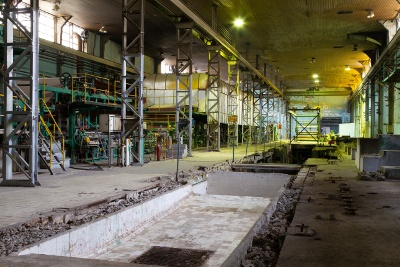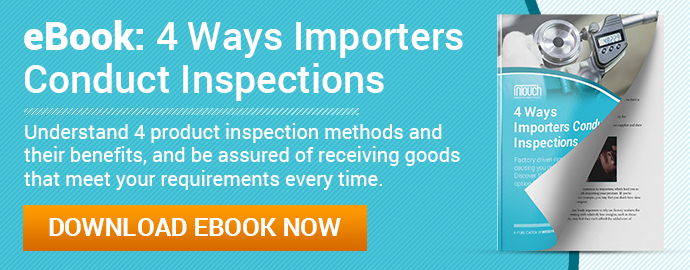 It’s late at night, and you hear the alert of a new message in your inbox. This is the email for which you’ve been waiting - after carefully searching online, you finally found a new supplier for a test batch of promotional stickers.
It’s late at night, and you hear the alert of a new message in your inbox. This is the email for which you’ve been waiting - after carefully searching online, you finally found a new supplier for a test batch of promotional stickers.
Or so you think…
“Sorry, no go on this order. Thanks for your consideration. Maybe talk again soon.”
At this point, you might be feeling a mixture of surprise and frustration. How could the supplier have refused your business? Was it because you wanted to start with a trial order? Did you say something offensive? Where did you go wrong?
Importers are often careful about which suppliers they trust with order fulfillment. However, many neglect to consider why a potential supplier might refuse their business. Fortunately, if you’re aware of the factors that tend to give suppliers “cold feet”, you’re in a better position to avoid that resistance and move towards working together.
Here are three reasons a supplier might refuse your business:
1. Small order quantities
If someone asked you to choose between working an hour for $100 or an hour for $15, which would you choose? Of course, we'd all prefer the first option. And although this is a highly simplified example,  factory owners and trading companies tend to have a similar mindset. A supplier might refuse your business if the order quantity is insignificant.
factory owners and trading companies tend to have a similar mindset. A supplier might refuse your business if the order quantity is insignificant.
Any order that a supplier accepts comes at an opportunity cost. The factory producing the goods will have to allocate resources for:
- Creating, and typically revising, product samples;
- Working with sub-suppliers to acquire necessary raw materials, parts and packaging for production;
- Preparing and calibrating equipment needed for production;
- Mass production of the goods;
- Any product rework or repairs requested by the importer; and
- Coordinating with a shipping company to load & transport the finished goods
A trading company or vendor has to factor in these efforts plus their own work needed to manage everything, and even QC staff they might hire to inspect the products before shipping.
Understandably, most suppliers would prefer to go through this process once on a larger scale rather than take on many smaller orders. You can try to assure a potential supplier that you intend to increase volume in the future and work with them long-term. However, it can be difficult to persuade a supplier that has better offers elsewhere.
"Recognizing that a #supplier also has opportunity costs can help you negotiate more effectively"Consider working with a smaller supplier
A larger supplier might reject an order if they find the quantity to be insignificant. On the other hand, you might find success working with a small to medium-sized supplier that isn’t yet well-established or equipped to handle larger orders.
While a smaller factory typically has less developed quality management systems, they’re likely to be cooperative in meeting product requirements and deadlines because their success depends upon retaining existing customers.
In short, you may want to seek out a smaller supplier if you find larger suppliers are refusing your business because of low quantities.
2. High costs & low margins
High costs can deter potential suppliers just as much as small order quantities. The difference here could involve design & development costs, or just the materials or components needed for a particular order.
A factory that manufactures low-margin items usually relies on production of a large enough scale in order to bring costs down and turn a profit. A supplier might refuse your business if high costs can’t be justified by high margins or large order quantities.
 For example, imagine the following scenario:
For example, imagine the following scenario:
- You approach a bag manufacturer about an order of 1,200 leather bags.
- You’re very particular about using a high quality, expensive leather hide for your product.
- The factory will need to order a quantity of leather much greater than that needed for your order, just to get a reasonable price from their supplier.
- And since this factory normally manufactures bags with other materials, they’re not likely to use the excess material on production for other customers.
In short, the high cost of wasted materials is going to push the factory’s margin very low. And believe it or not, refusing this order is actually in both parties’ best interests. Less ethical suppliers are likely to accept your order, only to disappoint you by sending finished goods made with lower quality materials.
Be reasonable in negotiations with a supplier
It’s worth stressing here that many importers make mistakes when negotiating with suppliers. They’ll often push too hard for a lower price. This, in turn, forces the supplier to compensate for the price cut by—you guessed it—cutting costs elsewhere, often by using lower quality materials or parts.
Consider the cost of raw materials and parts in your dealings with prospective suppliers. It’s often helpful to ask multiple suppliers for price quotes or request a sample bill of materials (BOM) to get an idea of the supplier’s costs. Just remember the old proverb, “you get what you pay for”. It’s as true here as it is anywhere else (related: 3 Tips for Stronger Supplier Relationships).
"Aggressively #negotiating for lower prices might also drastically reduce product quality #mfg"3. Insufficient production capability or capacity
You can’t expect a factory that specializes in wall-mounted LED signs to also be capable of manufacturing the larger signs installed in a professional sports stadium. Nor could you expect a small, 20-worker facility to be able to supply hamburger patties for all of the McDonald’s stores in California.
Some suppliers simply aren’t able to fulfill orders of certain products or quantities.
Investing in new technology or equipment
A supplier might refuse your business if it means needing to seriously upgrade their facility or  equipment. Giant companies, like Adidas, are moving ahead with plans to make “speed factories” capable of producing shoes with lightning-fast speed and remarkable efficiency. But you shouldn’t expect that your new supplier is ready and willing to do the same.
equipment. Giant companies, like Adidas, are moving ahead with plans to make “speed factories” capable of producing shoes with lightning-fast speed and remarkable efficiency. But you shouldn’t expect that your new supplier is ready and willing to do the same.
Upgrades to a factory can come at a major expense. A supplier may need to purchase new machinery, invest in worker training or even outsource major processes of production. In their eyes, such a major investment isn’t worthwhile if it doesn’t lead to more business. And a short-sighted supplier will see even less sense in upgrading their facility.
Of course, there are some suppliers that will claim they can do everything for you, even when they can’t. This often results in heavy use of sub-contractors, communication problems, production delays and other undesirable outcomes.
So, how do you know if your supplier is telling the truth about their capabilities?
Verify a potential supplier with an audit
The best way to be sure about a potential supplier’s production capability and capacity is to visit their factory. Few methods offer more insight than taking a walk through a facility to see production and other areas first hand.
You can avoid the confusion that many importers experience when trying to communicate by emails and phone calls alone. Visiting the factory also gives you the opportunity to clarify your product specifications and requirements face-to-face. Instant feedback from the factory manager or representative will give you a better indication of whether or not they can meet your needs.
If you’re unable to personally travel to the supplier’s facility, you may find it helpful to hire a third-party to conduct an audit for you. Such an audit typically consists of an intensive onsite factory evaluation and issues a rating based on compliance with the internationally accepted ISO 9001 standard.
This type of audit helps you determine if a supplier is right for you and can usually be completed at a fraction of the cost of traveling to an Asia-based factory yourself. In either case, it’s recommended that you avoid any supplier that refuses access to you or a professional third-party auditor.
"#ISO9001 audits help you determine whether a #factory can really do what it claims it can"Conclusion
There are an abundance of suppliers. And just because one might refuse your business, that doesn’t mean others will as well.
But always consider their perspective with regard to order size and price. And remember that an honest supplier will not agree to undertake fulfillment of an order with requirements they cannot meet. It rarely hurts to do some research and verify whether a potential supplier really can deliver on their promises.
And when you actually find a supplier that meets your expectations, you’re much more likely to experience long-term success and growth.
Lastly, don't forget to check out the manufacturing podcast episode that covers this article!
Have you encountered any other reasons why a supplier refused an order? Share them in the comments below!







